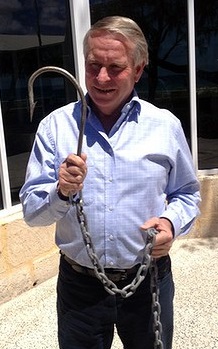Shark cull rolls ahead despite backlash from Greens, locals and science
 Thousands have gathered to protest the Western Australian government's shark-culling plan, but authorities say the slaughter will go ahead regardless.
Thousands have gathered to protest the Western Australian government's shark-culling plan, but authorities say the slaughter will go ahead regardless.
More than 4,000 people attended a rally at Perth's Cottesloe Beach over the weekend, joining together to voice their outrage at a plan to hang large baited hooks on lines outside popular beaches, hoping to snare any sharks which might otherwise threaten swimmers.
The protest was organised after the WA Government announced which of its popular beaches would have baited lines strung up in protection. The current plan will see dozens of hooks placed about a kilometre from swimming spots near Perth, in the South West region (where the most recent attack left one man dead), and at surfing hotspots south of Cape Naturaliste.
Conservationists and opponents to the plan say the cull is a knee-jerk reaction to recent fear-mongering. They say the $1 million spent on the plan could be more effectively used to cut down much greater risks to the population, such as road fatalities or death from poor health.
The WA Government has also called for professional shark hunters to sign up and gain the right to kill any sharks over three metres in length within designated areas. The deadline for culling applications has now closed.
The policies are the result of concerns raised by an increase in shark attacks at WA beaches, though opponents say the increase has been minor or negligible.
The 'mitigation' policy will go ahead, according to acting WA Premier Kim Hanes.
“The numbers have significantly increased in the last three years and we believe the Government had to do something about it,” Hanes said.
“We've had seven people that have lost their lives in our waters in the last three years compared to [20] over the last 20 years.”
Opponents say that not only is the government's approach based on the false 'rogue shark' theory, it is also likely to inadvertently cull other species, while not necessarily interfering with the individual specimens responsible for the handful of attacks in recent years.
Protest organiser Natalie Banks said in an interview before the event that the policy is devoid of any scientific basis.
“While the organisers of the rally acknowledge that the loss of human lives due to a shark attack is tragic, there is still much more research required to understand whether there is an increase in shark presence and if so, what the contributing factors are
“More needs to be done to develop sustainable shark attack mitigation strategies, including tagging and tracking, helicopter patrols, bubble curtains, underwater sounds and sharks' visual perception,” Ms Banks said.
“Our next step is to wait to see what action the state government will take on January 10... If the drums do go ahead I'm hoping people power will reverse the outcome.”
WA Greens MLC Lynn MacLaren said the poorly thought-out policy will damage the broader marine environment as well as impacting the livelihood of commercial shark enterprises.
“WA commercial shark fishers are especially concerned that the... policy will see the destruction of key breed stock of key species from their fishery, which is only now recovering, through careful management, from past overfishing,” McLaren said.
“In South Africa, the number of tiger and great white sharks caught on drum lines has been outnumbered by five times by the capture of smaller sharks, catfish, humpback whales and leather-back and green turtles on those lines.”







 Print
Print